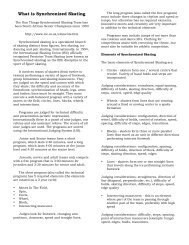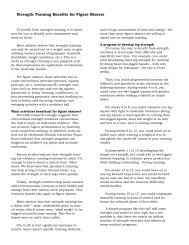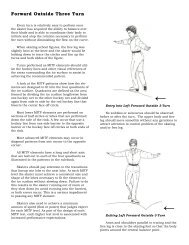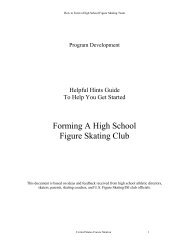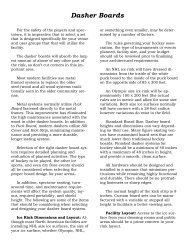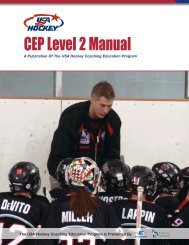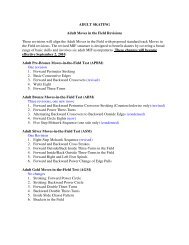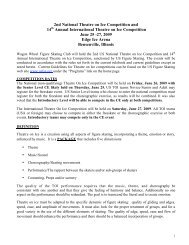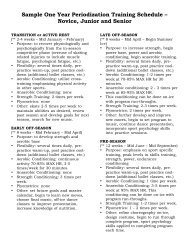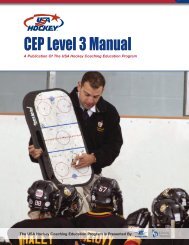When It's Time To Say Goodbye - Ice Skating Resources
When It's Time To Say Goodbye - Ice Skating Resources
When It's Time To Say Goodbye - Ice Skating Resources
Create successful ePaper yourself
Turn your PDF publications into a flip-book with our unique Google optimized e-Paper software.
http://skatepsa.blogspot.com/<br />
<strong>When</strong> It’s <strong>Time</strong> <strong>To</strong> <strong>Say</strong> <strong>Goodbye</strong><br />
PS Magazine September/October 2007<br />
I have to say I am getting quite good at spewing<br />
out all of the problems in our sport, but I think it<br />
is time for me to put my money where my mouth<br />
is. It is time to start talking about how we are going<br />
to change… how we are going to improve our<br />
image and ourselves!<br />
One of the issues that consistently comes up in<br />
our lives, and I am frequently questioned about, is<br />
what happens when we gain or lose a student.<br />
Here is a portion of an e-mail received at PSA:<br />
"… Could you please clarify an ethical situation<br />
for me: I was approached by a parent to coach her<br />
skater. They are no longer taking lessons from a<br />
previous coach. I spoke with her and she says they<br />
have an outstanding bill yet to pay.<br />
My understanding is that I must wait until this<br />
is paid prior to starting lessons. There also seems<br />
to be some controversy over some charges. What is<br />
my role in all this Your website says: Prior to acting<br />
as a coach the member shall determine the nature<br />
and extent of any earlier teaching relationship<br />
with that skater and other members. However, I<br />
don’t see any guidelines regarding the financial<br />
part. Can you please help me follow the correct<br />
procedure"<br />
The issue is one of professionalism and not<br />
automatically one of ethics. Our tenants of professionalism<br />
dictate how we wish to act with each<br />
other within our coaching community. Teaching a<br />
new client before his or her final bill is paid is not<br />
necessarily a breach of the PSA’s code of ethics,<br />
but a behavior referred to in some PSA communications<br />
as unprofessional.<br />
Regardless of the PSA’s interpretation, your<br />
peers alone could determine this to be unprofessional,<br />
which would not only create tension in the<br />
rink, but undermine your credibility as well. Your<br />
reputation will be tarnished and regaining the<br />
trust of the other coaches in the rink will be a time<br />
consuming act.<br />
I believe the best way to handle this issue is to<br />
open a dialogue with the previous coach to work<br />
out a compromise. Obviously, the controversial<br />
charges will be the question that needs to be answered.<br />
A coach who keeps immaculate records of lesson<br />
times, bills regularly, and doesn’t allow balances<br />
to get too high, will be in a much better position<br />
to collect his or her final payment.<br />
<strong>When</strong> a former coach gives an invoice to a parent<br />
for $1000, how many can pay that off in one<br />
chunk For a coach who charges $60 an hour,<br />
$1000 represents 16 hours of lessons. Three lessons<br />
a week could mean that the coach hadn’t<br />
billed in 4 months.<br />
How accurate is that statement going to be<br />
Did the skater show up for all the lessons Did the<br />
coach show up for all the lessons (Here’s a hint.<br />
Check with the rink and ask for copies of the attendance<br />
forms. Most rinks know who is on the<br />
ice.)<br />
Another issue is the coach who provides services<br />
such as editing music, etc and doesn’t<br />
charge…until the skater leaves them. I received<br />
one letter where coaches were teaching a skater for<br />
“free.” <strong>When</strong> the skater decided to move on, the<br />
family was given a bill for $6000!<br />
Motivational speaker Brian Dodge says, “People<br />
presume that because dishonesty often brings<br />
short-term advantages, it does not have long-term<br />
consequences; but time always tells the truth.”<br />
If you are the coach on the losing end of this<br />
arrangement, please think of your own image in<br />
the eyes of your peers. Your actions will scream<br />
loudly if you act childishly. Losing a skater is never<br />
fun; our pride takes a hit and we feel all eyes are<br />
upon us.<br />
The truth of the matter is that we all lose students.<br />
In fact, how many times did you change<br />
coaches as an amateur As a young man, I was
very hurt personally by a coach I left who called me<br />
a has-been from the day I left until I finally said<br />
something to her only a few years ago.<br />
Is it the child’s fault or the new coach’s fault<br />
that the parents have terminated your services<br />
Why make a thorny situation worse by being difficult<br />
We promote and teach sportsmanship; be a<br />
good sport!<br />
<strong>To</strong> prevent much of this from transpiring, a<br />
good idea is to have a written policy regarding your<br />
lesson fee structure, payment procedures, missed<br />
lessons and in the event of a parting of the ways, a<br />
termination policy.<br />
A termination policy could be worded to include<br />
that all balances must be paid before beginning<br />
with a new professional. Another clause could be<br />
to include the option of an independent arbitrator<br />
for disputed charges.<br />
You should have a signed copy of the policies<br />
from the parents. This will help you in the recovery<br />
of payment for services. It’s also cheaper than going<br />
to court or using a collection agency.<br />
In reference to any one of the examples in this<br />
editorial, here’s a closing thought: assume that you<br />
will be teaching in your arena, as will the other<br />
coach, for years to come.<br />
Your relationship with your fellow coaches will<br />
span an extensive period of time. The students<br />
come and go. The actions you take will have consequences<br />
either way.<br />
“Try not to become a person of success but<br />
a person of value.”<br />
Albert Einstein 1875-1955)



